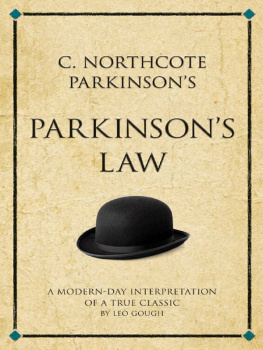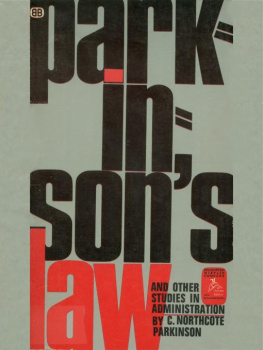C. NORTHCOTE PARKINSONS
PARKINSONS
LAW

A MODERN-DAY INTERPRETATION
OF A MANAGEMENT CLASSIC
BY LEO GOUGH

Copyright Infinite Ideas Ltd, 2011
The right of Leo Gough to be identified as the author of this book has been asserted in accordance with the Copyright, Designs and Patents Act 1988.
First published in 2011 by
Infinite Ideas Limited
36 St Giles
Oxford
OX1 3LD
United Kingdom
www.infideas.com
All rights reserved. Except for the quotation of small passages for the purposes of criticism or review, no part of this publication may be reproduced, stored in a retrieval system or transmitted in any form or by any means, electronic, mechanical, photocopying, recording, scanning or otherwise, except under the terms of the Copyright, Designs and Patents Act 1988 or under the terms of a licence issued by the Copyright Licensing Agency Ltd, 90 Tottenham Court Road, London W1T 4LP, UK, without the permission in writing of the publisher. Requests to the publisher should be addressed to the Permissions Department, Infinite Ideas Limited, 36 St Giles, Oxford, OX1 3LD, UK, or faxed to +44 (0) 1865 514777.
A CIP catalogue record for this book is available from the British Library
ISBN 9781906821340
Brand and product names are trademarks or registered trademarks of their respective owners.
Designed by Darren Hayball
Typeset by Sparks www.sparkspublishing.com
Printed and bound in Great Britain

INTRODUCTION
Nobody really wants more bureaucracy and red tape. Governments and multinational companies spend vast sums on trying to make their bureaucracies more efficient. Some management consultants spend their entire careers trying to cure dysfunctional administrative systems. Stock market analysts preach the need for lean organisations. Consumers complain of faceless corporations and government departments that cant seem to perform simple tasks in a timely fashion.
So, if nobody wants more bureaucracy, why does it just keep on growing? The answer is Parkinsons Law. According to Parkinsons Law, bureaucracies tend to expand for two main reasons: first, that bureaucrats naturally make extra work for each other, and second, that bureaucrats like to increase the number of people they are in charge of. Whats more, the growth in personnel bears no relation to the productivity of the organisation. The Law proposes that Work expands to fill the time available for its completion. In other words, in the average administrative office, everyone will always be busy, no matter how much, or how little, real work has to be done.
Cyril Northcote Parkinson was an obscure professor of history at a university in Singapore when he wrote Parkinsons Law in the late 1950s. Based on an essay he published in The Economist magazine, it appeared as a book in 1958 and became an instant bestseller worldwide. Its a gem of a book, stylish, witty, and satirical, that cuts through all the management theory guff to show how and why bureaucracies waste time. Parkinson became a celebrity and, after a few years as visiting professor at Harvard and Berkeley, gave up teaching to become a full-time writer and lecturer.
Because it was written in the 1950s, Parkinsons book reflects the norms of the time; for example, managers and bureaucrats are generally assumed to male, and the secretaries are assumed to be female. Some of the references to racial and cultural bias may make the modern reader feel a little queasy. Nevertheless, Parkinson was ahead of his time. He would have laughed at the explosion in management theory and business schools, and at the worldwide efforts of governments to make their civil services run more like businesses all exercises in futility, he would have said. Parkinsons Law A Modern-Day Interpretation of a Management Classic shows how you can apply his devastating critique of office life to analyse, and perhaps resolve, the frustrations we all experience, whether we are consumers, committee members, managers, office workers or civil servants.

MAKE-WORK IN ACTION
Politicians and taxpayers have assumed (with occasional phases of doubt) that a rising total in the number of civil servants must reflect a growing volume of work to be done The fact is that the number of the officials and the quantity of the work are not related to each other at all.
DEFINING IDEA
You will find that the
State is the kind of
organization which,
though it does big
things badly, does
small things badly,
too.
J.K. GALBRAITH, ECONOMIST
Parkinson wrote his book at the height of the era of state-directed economies, when the public sector was far larger than it is today. Since the 1980s, most governments around the world have tried very hard to reduce the size of their countries public sectors especially through the drive for privatisation and to make their employees more efficient and accountable. Similarly, multinationals have gone to enormous lengths to cut the dead weight out of their organisations. The trouble is, bureaucracy has a strange way of creeping back, like a fungus.
Why is this? Parkinson points to the essential problem: in any kind of office, it is easy to create unnecessary tasks with the best of intentions. Often, it is extremely difficult to judge whether a given administrative chore is worth doing they always seem worthwhile, especially to workers who have no overall picture of the process. Unless there are eagle-eyed managers who are obsessed with overall efficiency, office tasks will just naturally grow and grow, and more and more people will be needed to push the paper around.
Not long ago I was invited by a foreign government to go on an all-expenses-paid inspection tour of various locations in their country. No date for the trip was given. I applied in November and forgot all about it. Nearly eight months later, in June, I was asked for my passport details, address and other personal details. The next month, I was asked for my personal email address. The process went on and on. I had contact with seven different officials in three different cities. I had to give the same information to them again and again. They changed the date of the trip three times. I received and sent a total of 112 emails, and had 27 telephone conversations. I finally went on the trip two years after my original application. We didnt go anywhere that needed any special security clearance. I could have easily made the same trip as an ordinary tourist, and it would have cost me only 1500. I could have organised it in two days.
The country wasnt a failed state, or a less developed country; most official publications list it as a modernising, westernised, success story. So what went wrong? Every civil servant is afraid of upsetting their boss. Senior officials issue arbitrary orders and everyone scrambles to obey. Nobody ever tries to match time expended to results achieved. The result? Gross, stupendous incompetence that would put any commercial organisation out of business.

Next page















